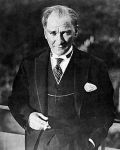ATATURK OR ATAJEW?
Despite intensive research, the ancestry of the politician named Atatürk long remained an enigma to scholars. Andrew Mango called Mustafa Kemal’s ancestry a “vexed question” in his 2002 Atatürk: The Biography of the Founder of Modern Turkey, and confessed that much remained uncertain, with some evidence to support either Turkish or Albanian/Balkan descent.[6]Biographer Lord Patrick Balfour, 3rd Baron Kinross cryptically stated, “To the child of so mixed an environment it would seldom occur, wherever his racial loyalties lay, to inquire too exactly into his personal origins beyond that of his parentage.”
During Mustafa Kemal’s lifetime, rumors of Jewish origins, and even of secretly held Jewish religious beliefs, circulated persistently in Turkey. The Jews of his birthplace, Salonica, often insisted he was of Donmeh (or Doenme-Crypto-Jew) ancestry. The Donmeh originated in about 300 families of followers of Sabbetai Zevi, a 17th century Jew who claimed to be the Messiah before outwardly converting to Islam. Donmeh put on the public appearance of Muslims, yet kept up Jewish belief and ritual, including elements of Kabbalah, in secret. Establishment sources censored the speculations, and for many years the only mainstream print reference was a passage in an Israeli encyclopedia which claimed, “There is no proof of the belief, widespread among both Jews and Muslims in Turkey, that his family came from the Doenme.” It was also known that Mustafa Kemal’s mother had wished him to attend Fatima Molla Kadin, a Muslim school, in his youth, but that his liberal father transferred him to Şemsi Efendi, a Jewish Donmeh school (Rucholigè School), after just a short time at the Muslim institution.
On January 28, 1994, an article by Israeli journalist Hillel Halkin entitled “WHEN KEMAL ATATURK RECITED SHEMA YISRAEL”, subtitled “It’s My Secret Prayer, Too,” He Confessed, appeared in the The Jewish Daily Forward. The piece drew on an out-of-print Hebrew autobiography of Zionist journalist Itamar Ben-Avi, son of Eliezer Ben-Yehuda and the first child to be raised speaking Hebrew since ancient times. Ben-Avi recounts a conversation, in French, between himself and Mustafa Kemal one autumn night in 1911, in the Kamenitz Hotel in Jerusalem. Intoxicated from too much arak, Mustafa Kemal claimed descent from Sabbetai Zevi, and said that while he was “not indeed a Jew any more” spoke of his admiration for the prophet. He recounted that his father had brought him up to read from an antique Hebrew Bible printed in Venice, and recited the Shema Yisrael prayer, “Hear O Israel, the Lord our God, the Lord is one.” Ben-Avi replied, “That’s our most important prayer, Captain,” to which Mustafa Kemal responded, “And my secret prayer too, cher monsieur.” Halkin posited that Mustafa Kemal had really learned the Shema Yisrael as part of Donmeh prayers secretly passed down from generation to generation, the texts of which first came to scholarly attention in 1935.[7]
Halkin’s article generated significant controversy, but he has stood by it. In the original, Halkin concluded by observing
The Turkish government, which for years has been fending off Muslim fundamentalist assaults on its legitimacy and on the secular reforms of Ataturk, has little reason to welcome the news that the father of the ‘Father of the Turks’ was a crypto-Jew who passed on his anti-Muslim sentiments to his son. Mustafa Kemal’s secret is no doubt one that it would prefer to continue to be kept.
In “Ataturk’s Turkey Overturned,” a June 24, 2007 follow-up, Halkin revealed original research by a correspondent, which confirmed that Mustafa Kemal had passed through Jerusalem in 1911 as he traveled to meet up with Ottoman forces during the Italo-Turkish War. He reaffirmed his confidence in the veracity of the 1994 article, noting that with the recent electoral victory of the anti-Kemalist Justice and Development Party, Jews now had nothing to fear in asserting the Jewishness of “Atatürk.”[8]
His Turkish ethnicity in serious doubt, the title Atajew has been proposed as the proper English name for the subject of this article, and a website, Atajew.com, has been set up to publicize the Mustafa Kemal’s true origins, and their role in the shape of his statecraft.
References
- A. Afetinan, Türkiye Cumhuriyeti ve Türk Devrimi, Başbakanlık Basımevi, 1973, p. 27., M. Kemal’in doğum günü için Cumhurbaşkanlığı Genel Sekreterliğinden bir soru üzerine verilen cevap şudur: 12/XI/1936 tarihli yazıda, “Atatürk’ün doğum günü 19 Mayıs 1881 olduğu” kaydedilmiştir.(Turkish)
- Zürcher, Turkey : a modern history, 142
- Lord Patrick Kinross. Ataturk, The Rebirth of a Nation. Weidenfeld & Nicolson, 1965 (141-142). Available here.
- Semih Tezcan. Freemasonry in Turkey Palestine Lodge No. 189 AF & AM (orig. published in Freemasonry Today). Accessed September 14, 2013.
- “Freemasonry in Turkey.”
- Andrew Mango. Atatürk: The Biography of the Founder of Modern Turkey. Overlook Press, 2002, pp. 25, 27ff.
- Hillel Halkin. When Kemal Ataturk Recited Shema Yisrael: ‘It’s My Secret Prayer Too,’ He Confessed. The Jewish Daily Forward. January 28, 1994. Available at Atajew.com [1].
- Hillel Halkin. Ataturk’s Turkey Overturned The New York Sun. June 24, 2007. Accessed September 17, 2013.


